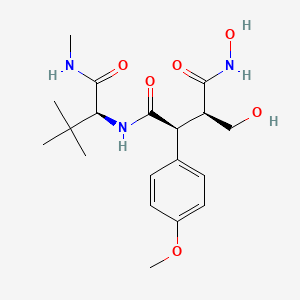m6A-centered Drug Response Information
General Information of the Drug (ID: M6APDG03230)
| Name |
PKF-242-484
|
||||
|---|---|---|---|---|---|
| Synonyms |
TNF-484
Click to Show/Hide
|
||||
| Status |
Investigative
|
||||
| Structure |
 |
||||
| Formula |
C19H29N3O6
|
||||
| InChI |
1S/C19H29N3O6/c1-19(2,3)15(18(26)20-4)21-17(25)14(13(10-23)16(24)22-27)11-6-8-12(28-5)9-7-11/h6-9,13-15,23,27H,10H2,1-5H3,(H,20,26)(H,21,25)(H,22,24)/t13-,14+,15+/m0/s1
|
||||
| InChIKey |
IOLRUMINDIUCLJ-RRFJBIMHSA-N
|
||||
| PubChem CID | |||||
| TTD Drug ID | |||||
Target Gene(s) and Their Upstream m6A Regulator, Together with the Effect of Target Gene(s) in Drug Response
The target genes involved in drug-target interaction (such as drug-metabolizing enzymes, drug transporters and therapeutic targets) and drug-mediated cell death signaling (including modulating DNA damage and repair capacity, escaping from drug-induced apoptosis, autophagy, cellular metabolic reprogramming, oncogenic bypass signaling, cell microenvironment, cell stemness, etc.) could be regulated by m6A regulator(s) and affected their corresponding drug response. You can browse detailed information on drug-related target gene(s) mediated by m6A regulators.
Matrix metalloproteinase-1 (MMP-1)
Methyltransferase-like 3 (METTL3)
| In total 1 mechanisms lead to this potential drug response | ||||
| Response Summary | Matrix metalloproteinase-1 (MMP-1) is a therapeutic target for PKF-242-484. The Methyltransferase-like 3 (METTL3) has potential in affecting the response of PKF-242-484 through regulating the expression of Matrix metalloproteinase-1 (MMP-1). | [1], [2] | ||
Matrix metalloproteinase-13 (MMP-13)
Fat mass and obesity-associated protein (FTO)
| In total 1 mechanisms lead to this potential drug response | ||||
| Response Summary | Matrix metalloproteinase-13 (MMP-13) is a therapeutic target for PKF-242-484. The Fat mass and obesity-associated protein (FTO) has potential in affecting the response of PKF-242-484 through regulating the expression of Matrix metalloproteinase-13 (MMP-13). | [2], [3] | ||
Methyltransferase-like 3 (METTL3)
| In total 1 mechanisms lead to this potential drug response | ||||
| Response Summary | Matrix metalloproteinase-13 (MMP-13) is a therapeutic target for PKF-242-484. The Methyltransferase-like 3 (METTL3) has potential in affecting the response of PKF-242-484 through regulating the expression of Matrix metalloproteinase-13 (MMP-13). | [2], [4] | ||
Matrix metalloproteinase-3 (MMP-3)
Methyltransferase-like 3 (METTL3)
| In total 1 mechanisms lead to this potential drug response | ||||
| Response Summary | Matrix metalloproteinase-3 (MMP-3) is a therapeutic target for PKF-242-484. The Methyltransferase-like 3 (METTL3) has potential in affecting the response of PKF-242-484 through regulating the expression of Matrix metalloproteinase-3 (MMP-3). | [5], [6] | ||
Tumor necrosis factor (TNF)
Insulin-like growth factor 2 mRNA-binding protein 2 (IGF2BP2)
| In total 1 mechanisms lead to this potential drug response | ||||
| Response Summary | Tumor necrosis factor (TNF) is a therapeutic target for PKF-242-484. The Insulin-like growth factor 2 mRNA-binding protein 2 (IGF2BP2) has potential in affecting the response of PKF-242-484 through regulating the expression of Tumor necrosis factor (TNF). | [7], [8] | ||
Methyltransferase-like 14 (METTL14)
| In total 1 mechanisms lead to this potential drug response | ||||
| Response Summary | Tumor necrosis factor (TNF) is a therapeutic target for PKF-242-484. The Methyltransferase-like 14 (METTL14) has potential in affecting the response of PKF-242-484 through regulating the expression of Tumor necrosis factor (TNF). | [8], [9] | ||
Methyltransferase-like 3 (METTL3)
| In total 1 mechanisms lead to this potential drug response | ||||
| Response Summary | Tumor necrosis factor (TNF) is a therapeutic target for PKF-242-484. The Methyltransferase-like 3 (METTL3) has potential in affecting the response of PKF-242-484 through regulating the expression of Tumor necrosis factor (TNF). | [8], [10] | ||
YTH domain-containing family protein 1 (YTHDF1)
| In total 1 mechanisms lead to this potential drug response | ||||
| Response Summary | Tumor necrosis factor (TNF) is a therapeutic target for PKF-242-484. The YTH domain-containing family protein 1 (YTHDF1) has potential in affecting the response of PKF-242-484 through regulating the expression of Tumor necrosis factor (TNF). | [8], [10] | ||
YTH domain-containing family protein 3 (YTHDF3)
| In total 1 mechanisms lead to this potential drug response | ||||
| Response Summary | Tumor necrosis factor (TNF) is a therapeutic target for PKF-242-484. The YTH domain-containing family protein 3 (YTHDF3) has potential in affecting the response of PKF-242-484 through regulating the expression of Tumor necrosis factor (TNF). | [7], [8] | ||
References